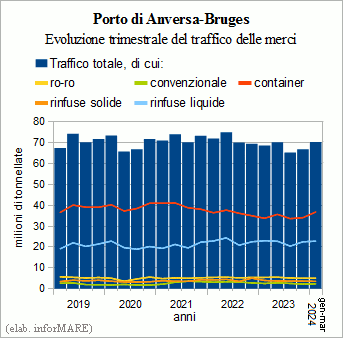
In the first quarter of 2024, the port system of
Antwerp-Zeebrugge handled a freight traffic of 70.4
million tonnes, with an increase of +2.4% on the same
period of last year that was generated by the growth of the
of containerised traffic, which, at 36.8 million tonnes,
recorded an increase of +8.6%. In terms of 20 containers
feet moved, container traffic was equal to
to 3.3 million TEUs (+6.0%). In the first three months of this year, the
liquid bulk traffic has remained almost
stable at 22.8 million tonnes (-0.9%),
while there has been a significant decrease in the trafficking of
dry bulk with 3.5 million tonnes (-12.1%), of cargo
conventional with 2.3 million tonnes (-7.8%) and rolling stock
with 5.0 million tonnes (-6.9%). New car traffic is
state of 860 thousand vehicles (-5.5%).
 With regard to the general traffic trend in the first
quarter of this year, the Port System Authority
Belgian specified that containerised traffic is
started to grow again in February and in March it scored the best
Monthly result since March 2021. The body specified that the
conventional freight traffic, although down by -7.8%, showed
an improvement having increased by +6.9% compared to
to the last quarter of 2023.
With regard to the general traffic trend in the first
quarter of this year, the Port System Authority
Belgian specified that containerised traffic is
started to grow again in February and in March it scored the best
Monthly result since March 2021. The body specified that the
conventional freight traffic, although down by -7.8%, showed
an improvement having increased by +6.9% compared to
to the last quarter of 2023.
Meanwhile, on the occasion of the extraordinary European Council of two
Days on the Economy and Competitiveness
opened today in Brussels and taking place at the same time in Antwerp
of the European Green Steel Industry Summit 2024, the
of the Port of Antwerp-Zeebrugge, the North Sea Port, Duisburger Hafen
and the Rotterdam Port Authority, pointing out that
Manufacturing industry in the triangle between the ports
Flemish-Dutch and the Ruhr region of Germany is
responsible for a large part of European production, have invited
European government leaders to support the industry at this stage
energy transition. "High-intensity businesses
energy - recalled the authorities of these systems
port authorities - face much higher costs in
Europe and other parts of the world and have to cope with laws and
more complex regulations. And in the United States, the massif
The Inflation Reduction Act's support package is making it more
attractive for companies to invest in the necessary renovation of the
Country. If governments do nothing in response to this, the
investments in sustainability in Europe will stop and
the industry will move out of Europe. Plants
will therefore be kept operational for as long as possible
possible as they get older and will eventually be shut down. That
means more imports from non-European countries with
negative climate impacts, our strategic autonomy and
well-being."
"More and more people - continues the note from the ports
Belgium, the Netherlands and the Germans - suggest that, if it is necessary to spend
more money, maybe it would be better to lose the industry rather than
than to safeguard it. We understand their doubts. The industry is not
free from some disadvantages and will not stop using
fossil resources and emit CO2 overnight. That
It requires a transition and maximum commitment from everyone. There
We hope that the industry will be able to do so in a timely manner.
Europe: after all, it provides crucial support to our ports,
together with logistics and the energy sectors. These sectors
represent around €63 billion of added value and more
half a million jobs. That's why the leaders of the
European governments need to combine climate and industrial policies
in their five-year plan, as recently highlighted by the
European companies in the "Antwerp Declaration for an Agreement on the
European industrial industry". We maintain healthy competition and
Let's strengthen our cooperation on the energy transition."